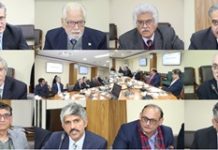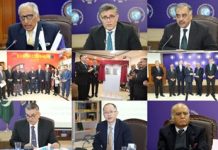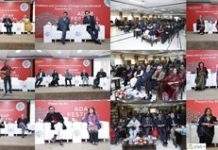Press Release
Centre for Middle East & Africa (CMEA) in collaboration with Institute of Peace and Conflict Studies (IPCS), University of Peshawar
Webinar
on
“Evolving Situation in the Middle East: Implications for the Region”
September 2, 2020
The Centre for Middle East & Africa (CMEA) in collaboration with Institute of Peace and Conflict Studies (IPCS), University of Peshawar organized a webinar titled “Evolving Situation in the Middle East: Implications for the Region” on September 2, 2020.
The distinguished panel of speakers included: Dr. Hussain Shaheed Soherwordi, Director IPCS; Ambassador Javed Hafeez, Former Pakistani diplomat; Dr. Farah Jan, Lecturer, University of Pennsylvania and Dr. Syed Qandil Abbas, Associate Professor, Quaid-e-Azam University, Islamabad.
Ms. Fatima Raza, Research Associate, CMEA, ISSI, gave a presentation on the occasion where she talked about the recent UAE Israel peace deal, the factors that contributed towards it, the world reaction and Pakistan’s stance on the issue.
In her introductory remarks, Ms. Amina Khan, Director CMEA outlined some of the issues facing the Middle East region- all of which she pointed out are extremely significant and highly relevant to both the regional and global political milieu. Fault lines within the Middle East are several and remain constantly evolving which makes it an ideal region for inquiry, research and debate. While issues revolving around growing economic disparity, displaced populations, land disputes, sectarian conflicts and ethnic rivalries warrants serious pondering and discussion – by far the issue of Palestine and plight of the Palestinians stands out as a unique example of occupation and apathy. Speaking with regards to the recent UAE-Israel rapprochement, she said that this development has once again highlighted that the Middle East remains in a continuous state of political insecurity which is both internal and external in nature.
In his welcome remarks, Director General ISSI, Ambassador Aizaz Ahmad Chaudhry said that no region has been affected more than the Middle East. He talked about how various events namely the aftermath of the 9/11 when Iraq was invaded, the Arab Spring after which destabilization proliferated the region and the wars in Yemen and Syria, have shaped current trajectories in the Middle East. He also outlined how the Palestinian crisis has taken on a new dimension as a result of which various Gulf countries are seriously considering rapprochement with Israel. Terrorism too has not been fully conquered which has resulted in unstable economies throughout the region, he said.
Dr. Hussain Shaheed Soherwordi said that the recognition of Israel by Muslim countries would mean lending a huge support base of both economic and political nature at the international level which could further isolate Palestine. He said that the Muslim world needs to convey to Palestine that its entire strength is behind its resolution as Israel also enjoys covert relations with several Arab countries. He admired Pakistan’s firm stance on the issue which will also discourage other Muslim countries from following in UAE’s footsteps. He further said that it was heartening that Iran has vociferously supported Palestine so has Saudi Arabia and Lebanon. Dr Soherwordi opined that Pakistan can lead a rejuvenated campaign to promote the cause of Palestine which could be a concrete step for preservation of the rights of the Palestinian people.
Dr. Farah Jan focused on the Pakistan-Saudi relationship, where she talked about the economic factors of this alliance which she said had given birth and might also eventually be the cause of strain in the future as well. She said that the three main pillars on which this relationship is premised are religion, economic and defense ties. Religion on its own is not sufficient for the endurance of this relationship, she said. This is why economic and security ties are critical. She talked about how Saudi Arabia’s labour needs in the 1970s commenced the Pak-Saudi relations which were further cemented because of the Kingdom’s security requirements. She went to elaborate how despite Covid19, the remittances from Saudi Arabia and the UAE have remained high which shows the economic significance these countries hold for Pakistan. Presently, labour force in Saudi Arabia is at a risk of losing their jobs, which raises questions on the Pak-Saudi alliances since if current trends – which include the Kingdoms transformation post 2017- continue, the need for Pakistani labour will diminish she said.
Ambassador Javed Hafeez outlined how the Middle East due to its strategic location and resources has been at the hub of interaction and rivalries. He also pointed out that what started out as competition between Iran and Saudi Arabia has now branched out into multipolar competition where actors such as Turkey have joined the milieu. Till recently, peace in Yemen was considered the key to overall Middle East peace. This now that does not seem likely. He also talked about how during the current financial year the financial situation in the Arab countries has become more difficult. The situation has been bolstered because of the wars, global oil crisis and Covid. The VAT in Saudi Arabia has increased from 5 to 15 percent amidst a huge budget deficit. Arab league and the Gulf Cooperation Council (GCC) are almost dysfunctional. The thinking of Arab leaders and the people are quite divergent particularly when it comes to Palestine and relationship with Israel. Talking about the impact of all these factors on the region, he said that this will result in a mass exodus of South Asian workers from the Gulf. He also talked about how since, most Syrian refugees have not been able to send their kids to school since 2011, there is whole a generation which is uneducated.
Dr Syed Qandil Abbas elaborated upon the geographical and historic significance of the Middle Eastern region being the birthplace of three transcendent religions. In contemporary time, it enormous oil deposits add to its importance. The creation of Israel made the region more volatile while the 1979 Islamic revolution of Iran converted it into the centre of gravity for this region. This recent Abraham accord adds a new layer of complexity to a region already mired in conflicts like in Iraq, Bahrain, Syria Yemen, Libya and of course in Palestine. This US-led deal will have long lasting repercussions as its major objective is the to bring out Zionist regime from political isolation on the international front as the popular public opinion in the region is usually anti-Israel. It will have a direct impact on this region and also will indirectly impact South Asia particularly with reference to already existing Indo-Israel equation and a possible UAE-India-Israel axis. This could be a potential challenge for Pakistan if the Indo-Israeli defence cooperation strengthens which is already an irritant in the region. He concluded that this deal would endanger regional peace and security in the region.
Ambassador Khalid Mahmood, Chairman Board of Governors ISSI, concluded the webinar. He said that in the midst of all the prevailing crisis, the rapprochement between the UAE and Israel adds to the exigency facing the region. He pointed to the various flaws in the Abraham accords and including how the name ‘Abraham’ accord itself politicizes religion. He said that the country that has gained most is Israel since it now has an ingress in the Islamic flanks of countries. Despite prospects of enhanced tourism and technology transfers, the UAE has not gained much, he said. Furthermore, notwithstanding the agreement, bombing in Gaza continues. On Palestine’s importance for Pakistan he said that the Palestinian cause holds great importance, particularly as it runs parallels with the situation in Kashmir. Adherence to and upholding the sanctity of the United Nations resolutions is the only durable solution otherwise we are just chasing shadows by pursuing half-baked peace deals, he said.












